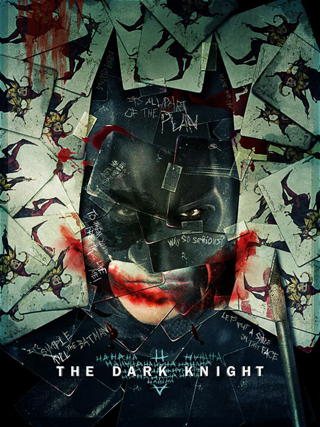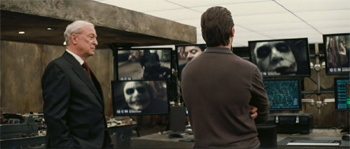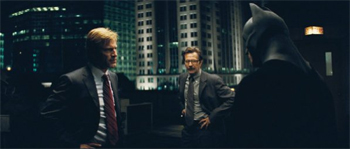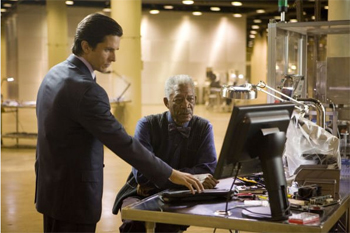|
The
Dark Knight
A high-pitched
note grates across the soundtrack. As Batman (Christian
Bale) and the Joker (Heath Ledger) circle each other warily,
the note only builds in intensity. Perhaps the Dark Knight's
cowl protects him from the noise, but certainly the Joker
hears it. Or worse - maybe it's coming straight from the
Joker's head.
With The Dark Knight, Christopher
Nolan has made comic book characters seem all too real.
It's more than a little disturbing to realize that Bruce
Wayne may be the least believable character in the bunch.
Watching Ledger's Joker almost makes this a horror film,
except you can't help but notice that the horror being reflected
may be our actual society.
Despite all the praise for Ledger's next-to-last
screen performance, it's a credit to Nolan's game plan that
the Joker does not overpower the story. The Clown Prince
of Crime serves as a catalyst, to be sure, and the effect
of his malevolence rarely fades, but The Dark Knight
does well by all the main players in Gotham City.
At
its heart lies the dilemma of the impact of Batman. Following
up on seeds laid in Batman
Begins, Wayne grapples with the inspiration he has
caused. Some police have turned to vigilantism, trying to
be helpful. New District Attorney Harvey Dent (Aaron Eckhart)
recognizes the good that Batman does, even if it's not legal,
and in turn Wayne hopes that Dent's "white knight" image
means that he can hang up his cowl.
Unfortunately for them all, Batman Begins
ended with a new player in town. From the opening shot of
the film, it's clear that the Joker has been harrying the
fringes of Gotham's criminal society for some time.
Though the story by Nolan, his brother
Jonathan and David S. Goyer hints at Alan Moore's classic
"one bad day" motivation, the Joker's origins remain a mystery.
He just is, and he couldn't be more terrifying because of
it.
This means, of course, that The Dark
Knight earns its PG-13 rating, and skirts the R by cutting
away before you could see much in the way of actual gore.
The tension, however, keeps as taut as that high-pitched
note. Even more so than in Batman Begins, Gotham
City simply isn't a nice place to live.
Yet people do. The average citizen in Gotham
City becomes very important throughout the film, and not
because of their opinions of Batman. Nolan shows us the
effect of comic book characters fighting, and the real fear
(and hope) that inspires.
Most of that reflects off of the family
of Jim Gordon (Gary Oldman). His wife and kids could be
any good cop's home life, and one shot makes it clear that
Batman might lurk around their tenement just to keep that
in mind.
But Gordon isn't the only officer to matter,
and the chaos in the city obviously puts cops both good
and trying to be good on a fence. The film doesn't pay them
short shrift; even minor characters become memorable throughout
the story. Not just memorable, actually, because the script
is that good. Burly Detective Wuertz (Ron Dean), for example,
seems like background until getting an absolutely pivotal
scene. Everybody makes an impact, and everybody's there
for a reason.
Thus a few recognizable character actors
can pop up briefly, and it's not a stunt. Nestor Carbonell,
a mostly comedic actor, can disappear into being the charismatic
Mayor of Gotham City. With only a couple of lines and minutes
onscreen, former wrestler Tiny Lister makes the most serious
impact to a film in his career.
They're all supporting a true ensemble.
In addition to Ledger's performance, Eckhart holds his own
as a character teetering on the edge of violence long before
circumstances make it obvious. Replacing Katie Holmes in
the role of Rachel Dawes, Maggie Gyllenhaal cuts right to
the heart of a woman torn between two powerful men without
losing her own power. She has an archness that seems confident,
not girlish, and if you can't quite believe that Bruce Wayne
would give up everything for her, well, that's because even
Wayne doesn't quite believe it.
The film keeps its focus on character,
and Bale's interplay with two masters of the craft, Michael
Caine and Morgan Freeman, only underscores that it's a shame
the two never have scenes together. The notes that Lucius
Fox (Freeman) and Alfred (Caine) could compare. But both
of them make it convincing that they would support a man
who dresses up like a bat, and both never quite sure that
they should.
Admittedly, Nolan's fight scenes still
feel jumbled, just clear enough at the beginning and end
of each sequence that you can tell what's going on. That
style does work a bit against a climactic construction site
fight; though everyone involved should be confused, it might
have been better if we weren't.
But
that's a tiny problem in an otherwise excellent film. Though
not for kids, The Dark Knight further vaults Batman
into being truly part of the American mythology, a character
who can reflect our darkest fears while still offering us
a bright beacon of hope.
What
about the IMAX question? If you can get to an IMAX screen,
sure, why not? It adds a little sweep to the sequences shot
specifically with the IMAX camera. But it's also still little
more than a breath-taking gimmick, and Nolan's storytelling
works either way.
|









